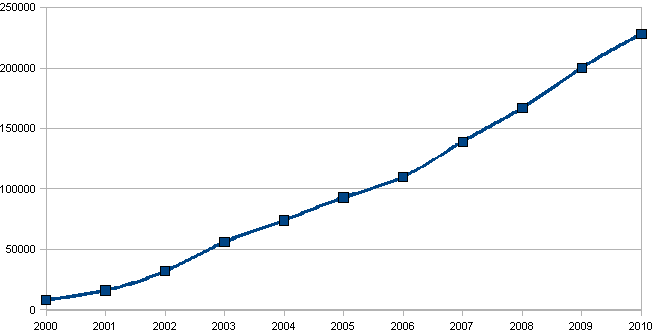|
Processed Book Project
The Processed Book Project is a prototype website and service with customized software tools, launched in November 2005, to explore the evolving nature of books, journals, and other authored content published electronically as digital data, and accessible on a widely connected, often global, network. Beginnings Supported by funding from the Hewlett Foundation, the Project grew out of an essay entitled "The Processed Book", published online in the open-access journal ''FirstMonday'' in March 2003, by Joseph J. Esposito, former CEO of Encyclopædia Britannica, who in 1994 launched Britannica Online, the first Internet encyclopedia. The essay proposed that a "processed book" will become "a node in a network, with connections to other books, commentary, online library card catalogues, teachers' recommendations, and so forth"—connections linking both to and from the e-book. Esposito noted that this is very different from the "Romantic myth" of the "primal book...usually written by a ... [...More Info...] [...Related Items...] OR: [Wikipedia] [Google] [Baidu] |
|
 |
Website
A website (also written as a web site) is a collection of web pages and related content that is identified by a common domain name and published on at least one web server. Examples of notable websites are Google, Facebook, Amazon, and Wikipedia. All publicly accessible websites collectively constitute the World Wide Web. There are also private websites that can only be accessed on a private network, such as a company's internal website for its employees. Websites are typically dedicated to a particular topic or purpose, such as news, education, commerce, entertainment or social networking. Hyperlinking between web pages guides the navigation of the site, which often starts with a home page. Users can access websites on a range of devices, including desktops, laptops, tablets, and smartphones. The app used on these devices is called a Web browser. History The World Wide Web (WWW) was created in 1989 by the British CERN computer scientist Tim Berners-Lee. On 30 ... [...More Info...] [...Related Items...] OR: [Wikipedia] [Google] [Baidu] |
 |
Hewlett Foundation
The William and Flora Hewlett Foundation, commonly known as the Hewlett Foundation, is a private foundation, established by Hewlett-Packard cofounder William Redington Hewlett and his wife Flora Lamson Hewlett in 1966. The Hewlett Foundation awards grants to a variety of liberal and progressive causes. With assets of approximately $14 billion, Hewlett is one of the wealthiest grant makers in the United States. The Foundation has grantmaking programs in education, the environment, global development and population, the performing arts, and philanthropy. The Hewlett Foundation is based in Menlo Park, California. History Bill and Flora Hewlett consolidated their philanthropic activity into the William R. Hewlett Foundation, which Bill, aged 53, founded in 1966 in their Palo Alto, California, home. Founding board members were Bill, Flora, and the couple's oldest son, Walter Hewlett. The years 1966-1972 were referred to as "the living room years". Flora Hewlett served as a board ... [...More Info...] [...Related Items...] OR: [Wikipedia] [Google] [Baidu] |
 |
Encyclopædia Britannica
The ( Latin for "British Encyclopædia") is a general knowledge English-language encyclopaedia. It is published by Encyclopædia Britannica, Inc.; the company has existed since the 18th century, although it has changed ownership various times through the centuries. The encyclopaedia is maintained by about 100 full-time editors and more than 4,000 contributors. The 2010 version of the 15th edition, which spans 32 volumes and 32,640 pages, was the last printed edition. Since 2016, it has been published exclusively as an online encyclopaedia. Printed for 244 years, the ''Britannica'' was the longest running in-print encyclopaedia in the English language. It was first published between 1768 and 1771 in the Scottish capital of Edinburgh, as three volumes. The encyclopaedia grew in size: the second edition was 10 volumes, and by its fourth edition (1801–1810) it had expanded to 20 volumes. Its rising stature as a scholarly work helped recruit eminent ... [...More Info...] [...Related Items...] OR: [Wikipedia] [Google] [Baidu] |
 |
WordNet
WordNet is a lexical database of semantic relations between words in more than 200 languages. WordNet links words into semantic relations including synonyms, hyponyms, and meronyms. The synonyms are grouped into ''synsets'' with short definitions and usage examples. WordNet can thus be seen as a combination and extension of a dictionary and thesaurus. While it is accessible to human users via a web browser, its primary use is in automatic text analysis and artificial intelligence applications. WordNet was first created in the English language and the English WordNet database and software tools have been released under a BSD style license and are freely available for download from that WordNet website. History and team members WordNet was first created in English only in the Cognitive Science Laboratory of Princeton University under the direction of psychology professor George Armitage Miller starting in 1985 and was later directed by Christiane Fellbaum. The project was ... [...More Info...] [...Related Items...] OR: [Wikipedia] [Google] [Baidu] |
 |
SourceForge
SourceForge is a web service that offers software consumers a centralized online location to control and manage open-source software projects and research business software. It provides source code repository hosting, bug tracking, mirroring of downloads for load balancing, a wiki for documentation, developer and user mailing lists, user-support forums, user-written reviews and ratings, a news bulletin, micro-blog for publishing project updates, and other features. SourceForge was one of the first to offer this service free of charge to open-source projects. Since 2012, the website has run on Apache Allura software. SourceForge offers free hosting and free access to tools for developers of free and open-source software. , the SourceForge repository claimed to host more than 502,000 projects and had more than 3.7 million registered users. Concept SourceForge is a web-based source code repository. It acts as a centralized location for free and open-source softwar ... [...More Info...] [...Related Items...] OR: [Wikipedia] [Google] [Baidu] |